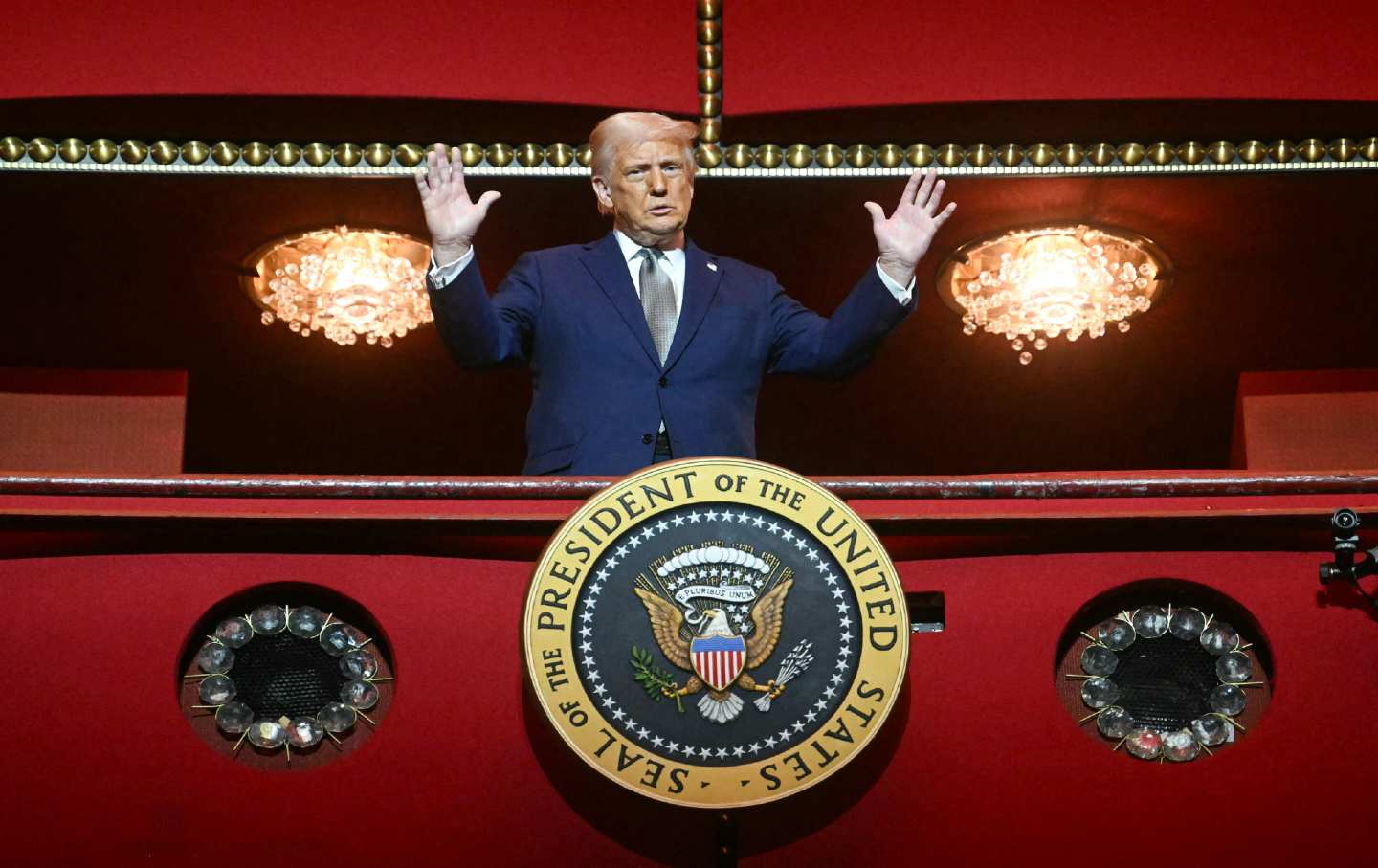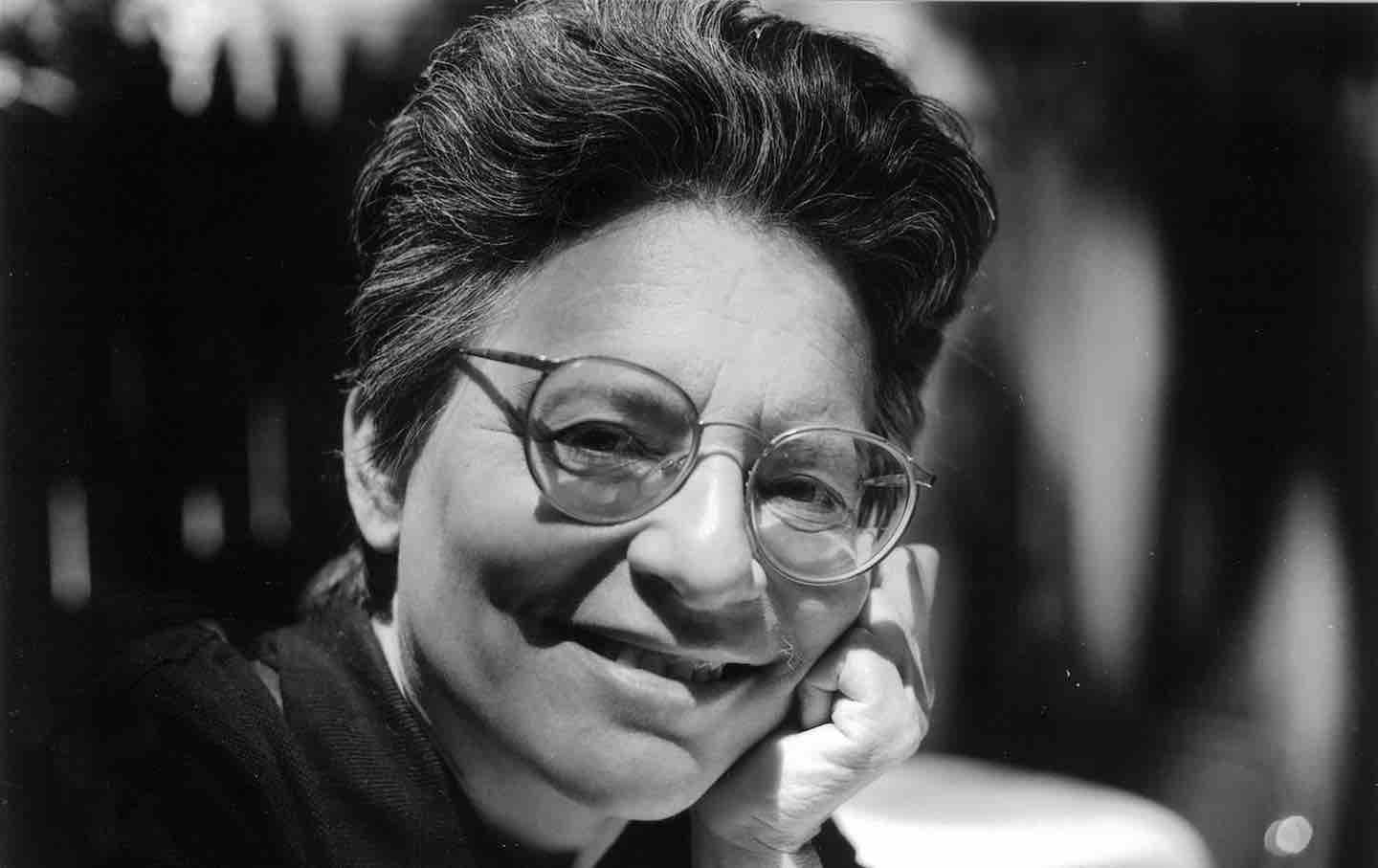The Culture-War Furies Behind Trump’s Film-Tariff Plan
The president doesn’t have the authority to impose tariffs on movies produced abroad, but he still wants to be the right’s designated culture commissar.

Donald Trump projects his cultural will-to-power from the presidential box at the Kennedy Center.
(Jim Watson / AFP via Getty Images)On Sunday night, President Trump issued his second imperial edict of the weekend regarding America’s real forever conflict—our culture war. The first was Friday’s executive order that he would, without apparent legal authority, personally defund two perennial conservative ogres, the Corporation for Public Broadcasting and National Public Radio. The White House deemed it “ENDING TAXPAYER FUNDING OF BIASED MEDIA.” (The needless capitalization, as you no doubt guessed, is his.) As the White House website goes on to explain, “At the very least, Americans have the right to expect that if their tax dollars fund public broadcasting at all, they fund only fair, accurate, unbiased, and nonpartisan news coverage.” PBS President and CEO Paula Kerger immediately dismissed Trump’s edict as “blatantly unlawful.” Unfortunately for conservatives, the long-held dream of defunding those two titans of cultural-Marxist programming still has not come to pass: Congress decides that funding, not the White House.
The second executive order came down Sunday night, when Trump posted on Truth Social that he would “immediately begin the process of instituting a 100% Tariff on any and all Movies coming into our Country that are produced in Foreign Lands. WE WANT MOVIES MADE IN AMERICA, AGAIN!… This is a concerted effort by other Nations and, therefore, a National Security threat. It is, in addition to everything else, messaging and propaganda!”
Trump’s demands for “unbiased” news and movies free of messaging and propaganda ring pretty hollow for many, many obvious reasons, but especially now as he personally takes over the chairmanship of the Kennedy Center. As a sitting president of the United States, he will personally control what a preeminent and semi-taxpayer-funded American cultural institution presents to the public. Clearly, he has no trouble with biased, partisan government influence on our culture, as long as he’s in charge of it.
Before we spiral out into a panic over $75 movie tickets to see a new Iñárritu film, it should be pointed out that Trump has no apparent legal authority to impose a foreign film tariff—movies are exempt from that presidential power. With no real card to play in his threats, the administration began its Monday morning back-pedaling bright and early. Trump press secretary Kush Desai announced, “Although no final decisions on foreign film tariffs have been made, the administration is exploring all options to deliver on President Trump’s directive to safeguard our country’s national and economic security while Making Hollywood Great Again.”
Well, it sure sounded like a final decision had been reached Sunday night. For Trump, what constitutes a “foreign film” is somewhat different than what most of us think of as a foreign film; i.e., one produced and created by mainly foreign funding and foreign artists abroad. To a man of Trump’s strident nationalist outlook, suspicious offshore productions would also include American films like Mission: Impossible—The Final Reckoning. Yes, even a Tom Cruise movie from an American studio like Paramount could fall under Trump’s America-first ban—and not just because Cruise grew up in Canada. The latest installment in the franchise was filmed entirely abroad, or as Fox News hosts like to huff, “on foreign soil.”
In Trump’s blinkered understanding of global trade, that means that the film was born in another country and must be treated like any other foreigner—harshly. With an estimated $400 million combined budget for M:I 8 and M:I 9, foreign subsidies matter a great deal in bringing down budgets. It’s simply too expensive to shoot in the states, and the city that feels that employment drain the hardest is Los Angeles.
Who knew Trump even cared about blue-state jobs—especially Hollywood jobs? In April, China threatened to ban all American films from its territory in retaliation for Trump’s global tariff war against the People’s Republic. For US studios, a loss of the Chinese market would be crushing. When asked about China’s retaliatory move at an Oval Office press conference, Trump shrugged it off with a smirk: “I’ve heard of worse things.”
However, in the three weeks since he blew off Hollywood, Trump told the White House press pool on Sunday that he had done some “strong research” on the subject. It turns out that this research was provided by one of his three special ambassadors to Hollywood, apocalyptic MAGA loyalist (and yes, genuinely great actor) Jon Voight. Suddenly, Trump found reasons to rescue the movie industry. “What they’ve done is other nations have been stealing the movies, the moviemaking capabilities from the United States,” he said to pool reporters. “Hollywood is being destroyed. Now, you have a…grossly incompetent governor that allowed that to happen, so I’m not just blaming other nations, but other nations have stolen our movie industry. If they’re not willing to make a movie inside the United States, then we should have a tariff on movies that come in. And not only that, governments are actually giving big money. They’re supporting them financially. That’s sort of a threat to our country in a sense.”
This move, in short, had every ingredient needed for a fresh Trumpian lunge at the new cycle: a drive-by attack on a Democrat, a depiction of a dystopian, devastated America, a prospective new front in his tariff war, and a whiff of conspiracy theory (stealing our “moviemaking capabilities”?). In this context, the complete lack of authority or enforcement power behind such an order scarcely mattered.
When, after all, has Trump ever cared about the film industry, except to bitch about the Oscars when Jimmy Kimmel roasts him? Like his edict to defund NPR and PBS—and his allied attacks on the Smithsonian, the National Endowment for the Arts, and the National Endowment for the Humanities—it’s the “messaging and propaganda” that riles him. In 2019, Korean filmmaker Bong Joon-ho’s Parasite, a satire of wealth and class disparity in South Korea, attracted the president’s scorn when it won the Best Picture Oscar—the first non-English language film to win the award. “How bad were the Academy Awards this year? Did you see it?” he asked a rally crowd in Colorado Springs, Colorado. “The winner is—a movie from South Korea! What the hell was that all about? We got enough problems with South Korea with trade. On top of that, they give them best movie of the year? Was it good? I don’t know. Let’s get Gone With the Wind. Can we get Gone With the Wind back, please?”
Pining away for a slavery-simping, anti-Reconstruction Lost Cause epic over a pointed satire of modern wealth disparity by an Asian filmmaker is peak Trump. What links his two weekend executive orders is not Trump’s concern for blue-state jobs or fair, accurate journalism—but Trump’s longing to control the culture of the United States from the White House. Trump’s first 100 days have been the largest full-scale culture war offensive in GOP history. Under the guise of rooting out antisemitism, the administration has gone after our universities to stifle dissent over Gaza and erase DEI. It has gone after news organizations that criticized the president, or who edited interviews of his political rivals in ways he thought flattering to them, demanding apologies from journalists and multimillion-dollar settlements from their parent companies. In our government, he has erased anything he regards as “DEI” or “woke,” from actual people who fit his description of those words to disassembling a Bureau of Alcohol, Tobacco, and Firearms installation commemorating the victims of gun violence, to removing a story about Jackie Robinson’s military history from a Pentagon website.
The culture crusade is also driving the White House’s economic oversight of the entertainment industry. Currently, the Trump administration has blocked the merger of Paramount and Skydance, has the Federal Communications Commission seeing whether it can revoke Disney’s broadcast license over ABC News and DEI, and now wants to hinder foreign films from distribution in the US and stop American productions from spending huge amounts of cash overseas during its tariff war.
Popular
“swipe left below to view more authors”Swipe →For all the concentrated fury of Trump’s assault on the entertainment and news industries, it represents a 21st-century update to an old right-wing playbook. The president’s insistence that “foreign” films contain “messaging and propaganda” sure sounds like the refrain that America Firsters and isolationists raised in 1941, on the eve of America’s entry into the Second World War. They held senate hearings in Hollywood to investigate “propaganda” movies—namely, anti-fascist, pro-British, anti-racist movies like The Great Dictator and The Mortal Storm. During the Senate Investigation into Motion Picture War Propaganda, Senator Gerald Nye of North Dakota offered pure Trumpian anti-immigrant paranoia. “Go to Hollywood,” he said. “It is a raging volcano of war fever. The place swarms with refugees. It also swarms with British actors. In Hollywood they call it the British Army of Occupation.” After the war, the House Unamerican Activities Committee briefly considered investigating the Ku Klux Klan for “un-American” activities, but settled instead on the Roosevelt-sponsored Federal Theater Project of 1935–39, which mounted racially integrated (i.e.,“woke” or “DEI”) productions of classic plays.
Sometimes, Republican lawmakers claimed that they merely documented how FDR allocated federal funds for cultural projects with biased, political agendas—but when they investigated private-sector movie studios, they asked the same questions about the same politics. In 1954, the Eisenhower administration approved its Cultural Presentations Program to counteract Soviet criticism of America for racial discrimination and civil rights abuses; designating Black performers such as Louis Armstrong and Dizzy Gillespie “jazz ambassadors” to improve America’s image abroad.
Yet, as the Eisenhower White House tapped the fame of such figures on its behalf, it was also withholding passports from artists like Paul Robeson unless they recanted their politics. The administration kept up this self-interested balancing act until 1957, when Louis Armstrong got fed up. He very publicly canceled his State Department–sponsored tour of the Soviet Union until the Eisenhower administration took action to enforce integration in the schools of Little Rock, Arkansas. “The way they are treating my people in the South, the government can go to hell,” he said. “The people over there ask me what’s wrong with my country. What am I supposed to say?”
In the 1960s, as the right became convinced once again that it was ceding control of the culture to a faithless liberal media elite, conservative lawmakers took aim at PBS and NPR as propaganda operations funded on the government dime. Considering how much money Republicans have raised during the ensuing half century as they continue whaling away at public media, you’d think the GOP would increase their funding. Instead, Trump’s unquenchable thirst for maximum pop-cultural renown and increased control over the culture industry is working mostly to transform the old right-wing culture-war hustle into an engine of economic and civic destruction. In other words: Score one for the Academy members who made Parasite Best Picture; and fingers crossed, maybe this year they will bestow their Academy Award for Best International Feature Film to Mission: Impossible—The Final Reckoning.
More from The Nation

The Fight for the Soul of Video Games The Fight for the Soul of Video Games
Marijam Did’s Everything to Play For makes a case for rebuilding the culture of gaming, which has become infected with rotten politics.

Can Spotify Be Stopped? Can Spotify Be Stopped?
The streaming service has completely changed what it means to make and listen to music. What can be done to reverse its enormous influence?

The Wandering Souls of Caspar David Friedrich The Wandering Souls of Caspar David Friedrich
The German artist’s landscape paintings tried to capture the sublimity of a world that has vanished.

Tender, Compassionate, Crushing: the Fiction of Shulamith Firestone Tender, Compassionate, Crushing: the Fiction of Shulamith Firestone
In Airless Spaces, the feminist theorist dramatizes what happens when capitalist alienation makes everybody miserable.

The Bloody Blues of “Sinners” The Bloody Blues of “Sinners”
Ryan Coogler’s blockbuster horror period piece sets out to reinvent the creature feature—for better and for worse.

Weike Wang’s Meticulous Satires of Identity Politics Weike Wang’s Meticulous Satires of Identity Politics
Rental House, a novel of marriage and manners, tries to make sense of how a blended family negotiates conflicts of race and class.


